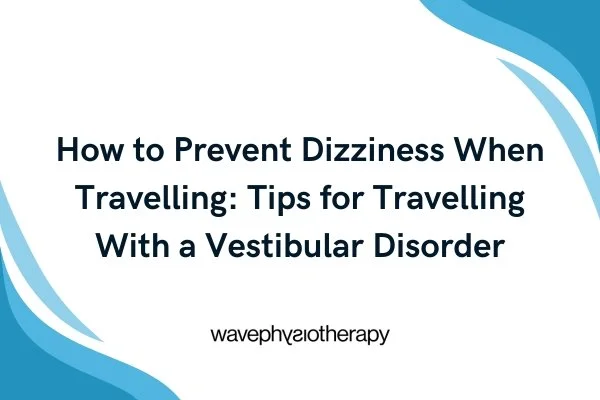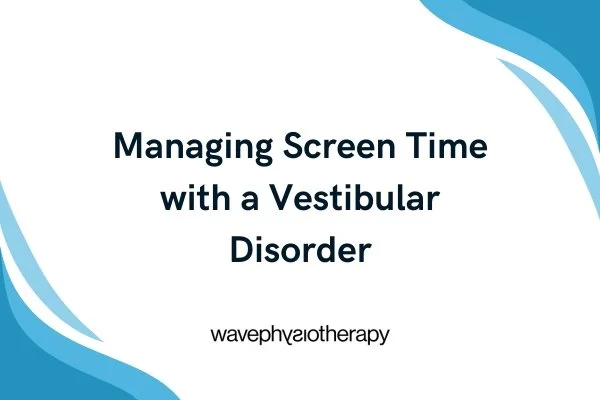Wave Physiotherapy Blog
Tips to Help Your Child Regulate Their Nervous System
When we’re not feeling our best, it’s common to feel tense, frustrated, sad, irritable, or even angry. It can be hard to figure out what’s needed in the moment to feel at ease and settled. The part of our nervous system that controls breathing, heart rate, digestion, temperature and our emotional state can be working in overdrive without us even being aware of it. Imagine how much harder it is for your child!
Benign Paroxysmal Positional Vertigo (BPPV)
If you have been experiencing vertigo, this article is for you. I cover what benign paroxysmal positional vertigo is, what causes it, how it's diagnosed and treated, and more.
What You Need to Know About Vestibular Therapy for Your Child
Have questions about vestibular physiotherapy for your child? I cover the topics I get asked about most in this article to help you get a good idea of what to expect when helping your child get care for their condition.
Managing Gatherings With a Vestibular Disorder
Returning to social activities again after having vestibular issues can make people feel nervous. Read on for tips on things to consider when getting back to being social again.
How to Ease Lower Back Pain: Tips to Manage Back Pain Better
Back pain is a common thing for humans to experience at some point in their life. This blog goes over my most shared tips for managing your back pain better.
Orthopaedic Physiotherapy: A Guide for Folks to Know if Physiotherapy Is for Them
A guide to help you know more about physiotherapy and whether it may be the right fit for you. I cover my most asked topics and tell you more about physiotherapy services at Wave Physiotherapy.
How to Prevent Dizziness When Travelling: Tips for Travelling With a Vestibular Disorder
Can I travel with a vestibular disorder? Yes, you absolutely can!
Here are tips to help you prepare for travelling so you can feel your absolute best while you're away.
Everything You Need to Know About Vestibular Therapy
This blog goes over what you need to know about vestibular therapy so that you feel confident reaching out to a vestibular therapist for help and what to expect when you get there!
School Tips for Children with Vestibular Issues
Kids with vestibular disorders are more likely to struggle in school. I share my most recommended tips to help your child’s school day go more smoothly by helping them feel more comfortable in the classroom.
Managing Screen Time with a Vestibular Disorder
Managing screen time with a vestibular disorder can be challenging. I share my frequently recommended tips so you can feel better while using your phone, tablet or computer.
Vitamin D Deficiency and Vestibular Disorders
You may be thinking: why is a physiotherapist talking about vitamin D in a blog? Vitamin D plays a really important role in the body! Vitamin D helps with the absorption and retention of calcium and phosphorus (which are important for the health of our bones and muscles), affects immune function, and has impacts on heart health, Type II diabetes, and certain types of cancer.
Infrared Goggles: Why Are They Important?
Infrared goggles allow for a better understanding of what is happening with the vestibular system. Results from testing help with diagnosis and treatment to make sure you’re getting the best care possible.
Top 5 Tips for Helping Kids Manage Nausea
Vestibular conditions come with a variety of unpleasant symptoms, including nausea. Nausea can have a huge impact on your child’s ability to be active, and eat and drink as they normally do. I share my top 5 tips for helping kids with nausea without medication.
Top 5 Tips for Managing Nausea Naturally
My top 5 most recommended tips for managing nausea. Nausea is one of the most unsettling symptoms of a vestibular condition and limits what you may feel comfortable doing in your day. Read more here for advice from an experienced vestibular physiotherapist.
Vestibular issues & kids: what to look for with a vestibular disorder
Children aren’t always able to tell their parents how they’re feeling or what’s happening when they are having difficulties with their vestibular system. It’s common to have to rely on what kids are doing vs what they say as clues to what is going on.















